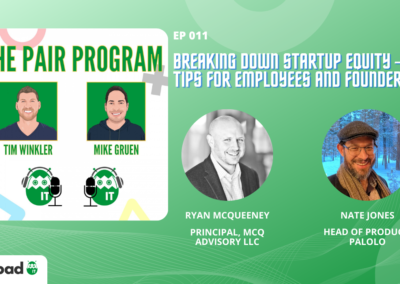Do you feel like you’ve stopped learning new skills and tools in your role? Maybe you’ve grown comfortable in your current processes and feel stuck in your day-to-day routine.
You might even feel the dreaded “S-Word”… stagnant.
Thankfully, that label does not need to be permanent.
We’ve collected the best tips for continuing your engineering education and your professional growth after college even when maintaining a full-time startup job.
Table of Contents
1. Ask Questions. And Then Ask Some More Questions.
The most important (and obvious) means of acquiring knowledge on the job, unfortunately, remains one of the most neglected.
The most common reason for why someone would refrain from asking questions in the workplace is that they suffer from imposter syndrome or feelings of self-doubt. After all, few people enjoy admitting ignorance in front of their colleagues (especially if they already feel underqualified for their current position).
According to a 2022 study, over half of all employees would be embarrassed to reveal how they truly feel about their abilities. That explains why this habit of concealing knowledge gaps has become a workplace norm.
However, being honest with yourself and others about what you don’t know is the only way you can grow as an engineering professional.
Not only is humility and a willingness to seek answers from others one of the top traits that startups look for in software engineers, but developing a clear map of your knowledge gaps will help you ask better questions that yield specific and focused answers from your peers.
Here are a few best practices for asking questions at work:
- Avoid disturbing teammates whenever a new question pops into your head. Instead, keep a categorized list of your questions and address a group of them at once.
- Find out when your colleagues are free of meetings. You’ll get better answers if you know that they can give you their undivided attention.
- Alert your team when you’re about to work with tools or software that you aren’t familiar with. That way, your teammates can anticipate that you may have a lot of questions as you work on your current task.
This level of transparency can feel uncomfortable at first. But taking these steps to ask strategic questions will help you fill in any gaps in your knowledge and show your team that you value their expertise!
2. Be An Active Collaborator.
One of the biggest reasons that an engineer’s skillset stagnates is that they only ever work in private.
In contrast, collaborating with colleagues on projects brings new perspectives to your workflows, which can teach you new skills or more efficient methods.
So how do you collaborate with teammates in a remote world?
A valuable option is to leverage online collaboration tools designed for distributed teams. Software like Google Meet, InVision, SharePoint, and Project.co feature easy file sharing, project templates, digital whiteboards, and communication channels that help team members express ideas and work together in asynchronous environments.
Likewise, establishing rubber duck debugging channels on Slack for team members to talk through problems in public can help formalize collaboration practices with peers and is a great way to make the most of your early days at a startup.
If your role requires you to work independently most of the time, you can still find ways to collaborate with your peers outside of work-related projects.
For instance, you can attend conferences and webinars with your colleagues, start clubs within your company, or organize Lunch ‘N’ Learns with your teammates to learn about what their working on or explore a new topic in technology.
Although you may not be directly improving the skills required for your role, opportunities like these will introduce you to new ideas and points of view, as well as creating camaraderie with your coworkers.
3. Set Aside Time for Learning or Training on The Job.
We get it; you’ve already got a full-enough plate at work as is.
Where are you supposed to find dedicated time for learning when you have so many other responsibilities to deal with?
Nevertheless, remember that you are solely responsible for your own education and training.
First, get familiar and comfortable with your typical workload.
An easy way to incorporate active learning into your weekly responsibilities is to make note of everything that you come across that you’re interested in learning – whether it’s a new concept that you want to explore or a tool you want to feel more confident in.
As your learning list grows, start to prioritize the items based on relevancy to your role. Then you can have a conversation with your manager about finding dedicated time for training while on the job.
While this conversation is much easier earlier in your role, emphasizing how this education will ultimately help drive business value (and demonstrating how important learning is to your professional goals) will likely persuade your manager to help you find at least one hour per week to explore new learning opportunities.
4. Shadow (or Serve as) a Mentor.
You’ve likely already heard about the importance of finding a mentor when you first join a startup.
Since early-stage companies often lack formalized training programs, sitting down with a colleague to familiarize yourself with the mission statement and your daily responsibilities will ease you into your first 30 days at a startup.
But mentorship is a valuable learning tool beyond your onboarding.
For example, after you’ve settled into your role, you can approach a team member about shadowing them for a couple of hours each week. They can provide guidance and knowledge about your work and potentially provide hands-on training in some of their duties that extend beyond the scope of your role.
Likewise, consider serving as a mentor to someone in your organization.
As most education programs for engineers prioritize technical training, taking a protégé under your wing when they’re still early in their career is a great way to build up your soft skills in managing people.
Showing your manager that you have training in different areas of the organization and that you have management experience can be strong signals that you’re ready for a promotion!
5. Volunteer to Work on Special Projects.
Maybe your company simply cannot afford to have you take time out of work to explore new skills right now.
In that case, ask your manager if there are any special projects that you can work on.
At any fast-growing startup, it’s likely that there are several outstanding tasks that don’t directly fall under any particular role but still need to be completed.
Consider volunteering yourself for projects that would give you experience in a new skill. Your manager will be more inclined to give you time for additional training when it’s clear how your education on the job will directly help the organization.
Here are some options for special projects that can expose you to new aspects of the business:
- Streamline outdated company processes. Taking the lead on simplifying how your company manages projects, prioritizes tasks, communicates asynchronously, and/or shares files is a great opportunity to gain experience in operations while improving efficiency company-wide.
- Document Standard Operating Procedures (SOPs) for other departments. Volunteering to record written operating procedures for busy colleagues will provide documentation for new hires and give you insight into different projects.
- Research potential new products or markets. Investigating how to expand or make the most out of your current product offerings will give you a deeper understanding of the business, while opening doors to new customers.
Furthermore, don’t hesitate to pitch your own special projects to work on. Your managers will appreciate you finding company problems that they missed and offering solutions to help tackle them.
6. Pursue an Engineering Certification.
If all else fails, engineering certifications are reliable pathways to education while upholding a full-time startup position.
Unlike traditional degrees, engineering certification programs are structured around full-time work and school schedules and can be completed in a much more condensed timeframe.
And as universities have grown eager to provide continued education courses and webinars online, it has never been easier for a startup engineer to pursue a certification in a new area of study while maintaining the same level of output to their startup organization.
Here is a list of some of the best certifications for software engineers in 2023.
Your Education Should Never End.
It’s easy to feel like you’ve completed your engineering education after you receive your college diploma or bootcamp certification.
After all, you’ve already dedicated so much of your life to learning. It’s normal to feel like you’ve put in the hard yards and now can just focus on the work.
But it’s vital that you never stop learning, no matter your age or position. Even if you land that dream job, you can always learn new skills, processes, and perspectives. Learning makes work more lively and opens you up to new opportunities.
With these tips, hopefully you’ll never again feel stagnant!





